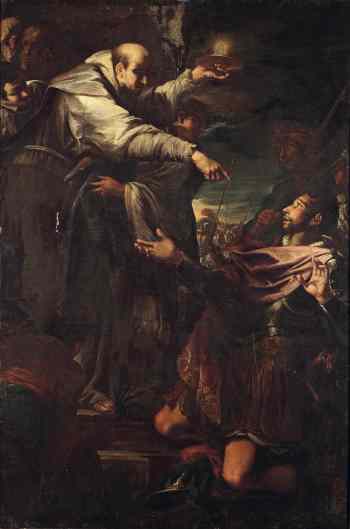Saint Bernard the Wonderworker : St Bernard Combats Heretics with the Hand of God
Click Here to Download the Entire AudioBook on St Bernard the Wonderworker.
Transcript
The progress of error had been already repressed at its source by the glories of the holy war, and heresy appeared to have lost the sort of charm which it had exercised over the lovers of novelty, from the moment that nobler interests had taken possession of the public sympathy.
But if the tree of the knowledge of evil no longer exhibited its proud summit in the light of day, its roots stretched all the deeper into the darkness of the earth ; and its seeds, dispersed by the winds, were preparing to bring forth, at some future time, the fruits of bitterness and death.
The Pope, according to the ancient tradition of Rome, was in no hurry either to condemn or to punish; he desired to penetrate to the bottom of things; and for this purpose he waited till the noise of arms should have ceased in the west, that he might examine, amid the peaceful and universal silence, the doctrine of the innovators. He settled himself, for a time, at Paris, where St. Bernard, on his return from Treves, was not long before he joined him. A case, which could not so well endure delay, pressed very much upon the holy Abbot of Clairvaux. It was the terrible ravages which the apostate, Henry de Bruys, had caused in the southern provinces of France. We have given an account in another place of the doctrines of this heresiarch, and the disturbance occasioned by him both
In churches and individual souls. Eugenius judged it fitting to send into these provinces the Cardinal Albini, Bishop of Ostia, accompanied by the learned Godfrey Bishop of Chartres, and St. Bernard himself. The latter had first despatched a letter to Hildephonsus, the Governor of Narbonensian Gaul. He blamed him for having tolerated the preaching of the monk Henry, and set before him most energetically all the evils of which it had been the cause. ” The infection which this man has spread through your states,” said he, in conclusion, “’is felt throughout the whole world. This h the cause of the journey which we are about to undertake come not amongst you of my own accord ; duty calls me, charity draws me. Perhaps it may be granted to me to pluck up out of the Church this poisonous plant, with its multiplied offshoots. It is true, mine is but a feeble arm for such a work, but I reckon upon the help of the holy bishops with whom I come, and on the powerful aid which I expect from you. At the head of the prelates to whom the Holy See has confided the care of this important affair, is to be seen the illustrious Cardinal Bishop of Ostia, celebrated in Israel for the victories which he has obtained over the enemies of God. It belongs to you to give an honorable reception to this prince of the Church, and to second, according to the power which God has given you, a mission which has no other object but your salvation and that of your subjects.”’
Notwithstanding this recommendation, and, perhaps, against the good will of Count Hildephonsus, the legate was disrespectfully received by the city of Albi. The great majority of the inhabitants of this unhappy city had rejected, together with the dogma of the supremacy of the Pope, the greater part of the teaching of the Church ; and not only did they refuse to assist at the holy sacrifice which the Cardinal celebrated in their Cathedral, but they evinced, by cries and sounds of discordant music, the displeasure which nis visit caused them, and the hatred they bore to the Holy See ” These people,” writes Godfrey, “welcomed him with the braying of asses, and the sounds of drums; there were scarcely thirty of the faithful at his Mass.”
St. Bernard arrived in the same city two days after the cardinal. “In the morning he caused the bell to ring for Mass,” says the chronicler, ” and, whether from curiosity to behold the most celebrated man of his day, or from the extraordinary blessing which followed wherever he went, the Albigenses flocked in such great numbers to the church, that the vast nave could scarcely contain them.” The servant of God, after the celebration of the holy mysteries, mounted the pulpit to preach the Gospel to the multitude of erring men, who were all impatient to hear him. He spoke to them with the greatest gentleness, and explained to them, article by article, the different points of Catholic doctrine which the innovators had rejected or corrupted. Not satisfied with rectifying their doctrinal errors, and enlightening their minds, he applied himself especially to the task of gaining their hearts, according to the recommendation of the prophet, ” Speak to the heart of Jerusalem, “and this method was the more easy to him, because his gracious words poured forth from an inexhaustible fountain of love. A power at once sweet and penetrating, a balsam of life, insinuated itself into the depths of their rebellious hearts, and softened their minds, like a soft shower which reanimates a field of corn, and sinks into the dried stems, recalling sap and life. The people who heard him showed, by their tears, the feeling which he had kindled within them, and the discourse was scarcely finished, when truth triumphed. “Enter, then, into yourselves,” said the holy preacher; ” return, erring children, into the unity of the Church, and,
that we may know who are those who have received the word of salvation, let them raise the right hand to heaven in token of their adhesion to the Catholic faith. “At that moment all raised the right hand, and testified, by a shout of joy, their return to the bosom of the Church.
The monk Godfrey, who regarded this touching scene as one of the most marvellous effects of the words of the man of God, describes several other miracles wrought at Bergerac, at Calais, at Vertefeuille, at Toulouse, and at other places. The most remarkable fact is that which happened at the town of Sarlat, in Perigord. ” In this place,” says the chronicler, ” after having preached to the obstinate heretics, they presented loaves to him to bless, as he was in the habit of doing elsewhere. When he had done this here he pronounced the following words : “You will acknowledge that we announce the truth to you, and that the innovators have seduced you from it, if you’re sick people recover their health by eating this bread.’ At these words, as he thought too positively spoken, the pious Godfrey, Bishop of Chartres, became alarmed, and added : “Which means that they shall be cured if they eat with a lively faith. “No” replied the saint, in a tone which bespoke perfect confidence, “I say that all those who shall eat of this bread shall be healed of their sickness, that they may recognize, by this token, that our words are according to God and His truth.” The miraculous bread produced numberless cures; and this miracle so forcibly struck the population of the neighboring towns, that Bernard was obliged to change his route to escape from the intolerable honors of which he was the object.
At Toulouse the effects of his words were not less abundant ; but the excitement and the demonstrations of respect which were showered upon him by the inhabitants of this town, nearly brought a serious illness upon St. Bernard. It is said that his hands were many times so covered with kisse that they swelled considerably, as did, also, his thin and delicate arms, to such an extent that he could no longer give the benediction. But his infirmities did not lessen his zeal, and, like a victim ever ready for the sacrifice, he labored for the salvation of his brethren at the expense of his own life. It is this profound abnegation which so fitted him, In the hands of God, for great things. ” What dost thou expect from me, my Lord and my God ?” said he one day ; “these people seek for miracles, and we shall derive small profit from our words if Thou dost not confirm them by the tokens of Thy power.” He pronounced these words as he left the house of the Canons Regular of Toulouse, where an ecclesiastic, named Bernard, was ill, having been struck with palsy. But the man of God had hardly passed the threshold of the door when the dying man sprang from his bed, and ran after St. Bernard to thank him, with an effusion of gratitude, for his sudden and perfect recovery.
And so we too in this age of faithlessness should run to St Bernard of Clairvaux. Not only to find a person worthy of imitation, or a sound Doctrine, but as a powerful heavenly intercessor who was mighty instrument of God while he walked among us.
St. Bernard, who, passing like an apostle through all the kingdoms of the West, carried to all
peace and joy, working great wonders, deciding the most difficult questions, concluding the most complicated affairs, assisting at counsels, confuting errors, converting the most hardened sinners: obtain for us, of the Lord, the grace, that by our lives we may shed the odor of Jesus around, and have, like you, a lively faith that can move mountains and an ardent love for
the Most Holy Eucharist, the greatest and the most precious treasure of Christianity. Amen
Saint Bernard, Pray for us!
Download MP3 of St Bernard the Wonder Worker: St Bernard Combats Heretics with the Hand of God (Right Click and Select Save As)
Click Here to Go Back To the AudioBook Page
Click here to make a novena to St Bernard
Credits
Saint Bernard the wonder worker, excerpts from the Life and Times of Saint Bernard by Abbot Theodore Ratisbonne and Heroic Virtue: A Portion of the Treatise of Benedict XIV on the Beatification and Canonization of the Servants of God Volume III.
You may also like:
- Saint Bernard the Wonderworker: Part 7 The Failure of the Second Crusade
- Saint Bernard the Wonderworker: Part 6 More Miracles on St Bernards Journey
- Saint Bernard the Wonderworker: Part 5 Miracles at Christmastide
- Saint Bernard the Wonderworker: Part 4 The Crusades and St Bernard
- Saint Bernard the Wonderworker: Part 3 More Miracles in Milan
- Saint Bernard the Wonderworker: Part 2 The Labors of Saint Bernard in Milan
- Saint Bernard the Wonderworker: Part 1 Early Miracles of St Bernard.






